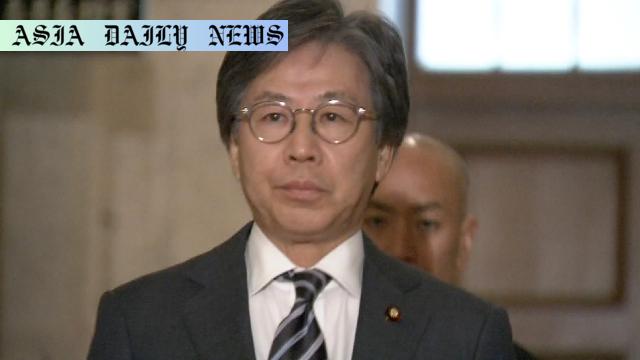Political Fund Scandal: Ex-Abe faction treasurer Matsumoto Junichiro questioned on $4.5M undeclared funds in LDP scandal.
A $4.5M political fund scandal implicates the LDP’s ex-Abe faction.
Kickbacks and undeclared funds reported from faction fundraising.
Matsumoto Junichiro, ex-chief treasurer, under scrutiny in closed-door session.
Senior officials denied involvement in resumption of kickbacks.

Overview of the Political Fund Scandal
The political landscape of Japan has been rocked by revelations of a significant political fund scandal implicating the Liberal Democratic Party (LDP). This controversy primarily centers on approximately $4.5 million (675 million yen) in undeclared revenues generated from fundraising activities over five years, through 2022. The scandal casts a shadow over the legacy of the late Prime Minister Abe Shinzo, as the implicated faction was previously under his leadership.
Key Allegations and Concerning Practices
At the heart of the scandal is the resumption of kickbacks from fundraiser revenues to lawmakers, despite a prior decision by Abe Shinzo to discontinue the practice. The issue involves faction members selling more party event tickets than their assigned quotas, keeping revenues from extra sales, and failing to declare these earnings in faction or personal political fund reports. Such activities are reported to violate Japan’s political fund control law, which mandates transparency in political financing.
The Role of Matsumoto Junichiro
Matsumoto Junichiro, the former chief treasurer of the Abe faction, faced questioning by the Lower House Budget Committee. In a closed-door session lasting roughly 40 minutes, Matsumoto revealed that the practice of kickbacks was suggested for resumption by a senior faction official in mid-2022. This led to a meeting involving four prominent LDP figures. However, Matsumoto refrained from naming the individual, citing their current non-incumbent status.
Involvement of Senior LDP Officials
During a notable meeting in August 2022, four senior LDP officials—Shionoya Ryu, Shimomura Hakubun, Nishimura Yasutoshi, and Seko Hiroshige—are said to have discussed the resumption of kickbacks. While Matsumoto claimed their talks indirectly facilitated the resumption, the officials have denied reaching any conclusion on the matter. This divergence in statements raises further suspicion and controversy.
Legal and Ethical Violations
The undeclared revenues from party fundraising events constitute a serious violation of the political fund control law in Japan. By failing to disclose gains from extra ticket sales, and reportedly using some revenues for unofficial purposes, lawmakers are accused of undermining the fundamentals of political transparency. Matsumoto himself received a suspended sentence for withholding the disclosure of the $4.5 million in revenues over five years.
Political Implications and Fallout
This scandal has resulted in significant reputational damage to the LDP. It has not only shed light on systemic irregularities within intra-party factions but also raised questions about leadership and adherence to ethical governance practices. Opposition members continue to demand accountability and transparency, questioning the potential complicity of top-ranking LDP figures.
Public and Parliamentary Reactions
The opposition Constitutional Democratic Party has taken a strong stance on the issue, with its representatives disclosing details from Matsumoto’s parliamentary questioning. Chair Azumi Jun has further called for complete transparency regarding who initiated the controversial resumption of kickbacks. Meanwhile, public sentiment appears increasingly critical as revelations mount about covert operations and financial misconduct among lawmakers.
Way Forward: Restoring Political Integrity
Amid calls for reform, the LDP faces increased pressure to address the systematic loopholes exploited by lawmakers. Restoring trust will require not only better internal oversight but also comprehensive reforms to ensure financial transparency in political operations. This includes stricter compliance with existing laws and preventative measures against concealment practices in fund declarations.
The future outlook depends heavily on cooperative bipartisan efforts to rebuild public faith and ensure that political parties adhere firmly to the principles of integrity and accountability.



Commentary
Understanding the Cultural and Political Context
The ongoing political fund scandal involving Japan’s Liberal Democratic Party exposes systemic flaws within its factional structures. While financial irregularities are not uncommon globally, the scale of the issue here underscores a deeper cultural problem within Japanese politics. The resumption of kickbacks among LDP leaders, even in the shadow of Abe Shinzo’s reforms, speaks volumes about power dynamics and entrenched practices that resist change.
The Need for Transparent Governance
This scandal highlights the critical importance of political transparency, particularly in countries with strong democratic traditions like Japan. By allowing these practices to fester, the LDP risks undermining public trust in its leadership. Transparency forms a cornerstone of democratic stability, and such revelations can destabilize not just a single party but broader trust in democratic institutions if not adequately addressed.
Broader Implications for Democracy
The fallout of this scandal serves as a cautionary tale for other nations, especially those struggling with corruption issues in governance. While the financial figures are concerning, it is arguably the attempted concealment of these activities that is most alarming. Nations looking to uphold democratic integrity must emphasize stringent laws governing political funds and proactive compliance monitoring to deter similar instances.
Final Thoughts
Ultimately, the LDP has a crucial opportunity to rebuild its reputation and set a positive example for political ethics moving forward. The willingness to confront internal misconduct and adopt reforms could position it as a stronger, more credible institution. For now, however, these issues serve as a needed reminder of the importance of integrity and accountability in maintaining public trust in leadership.